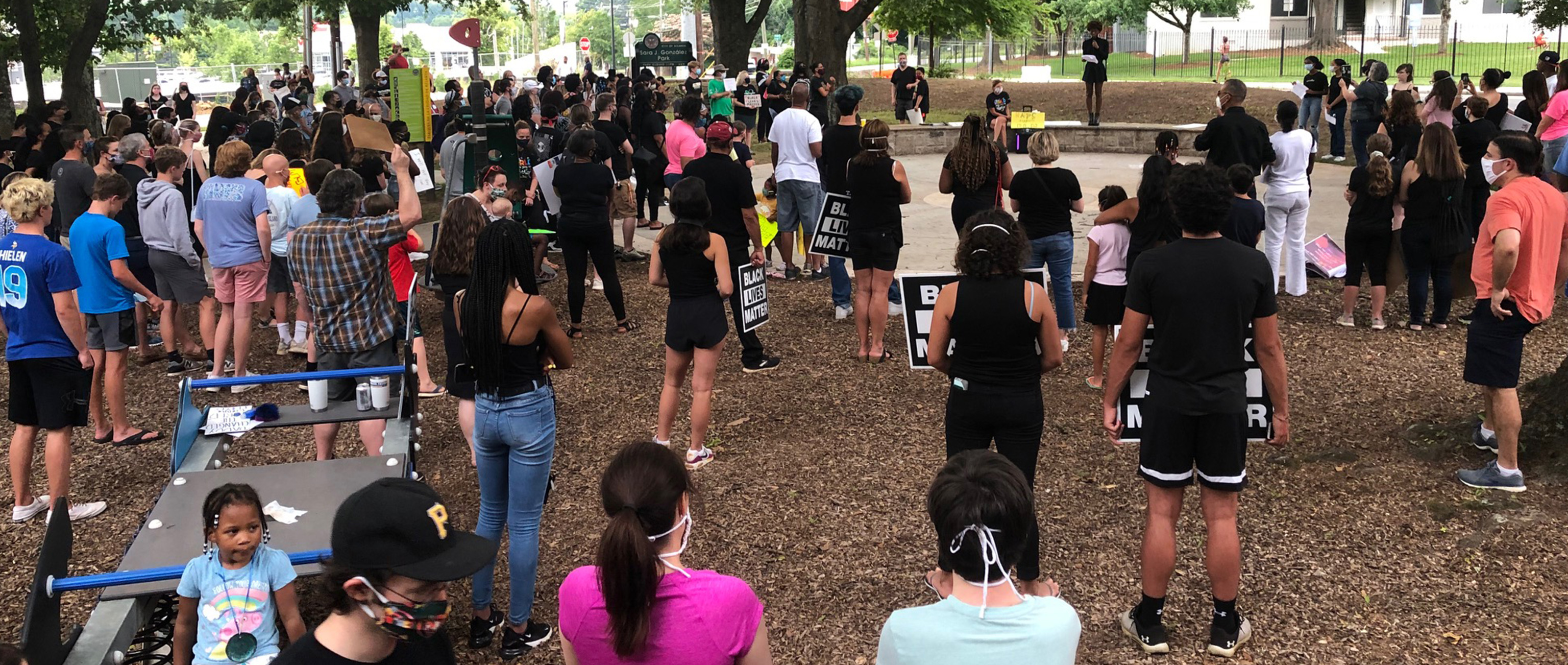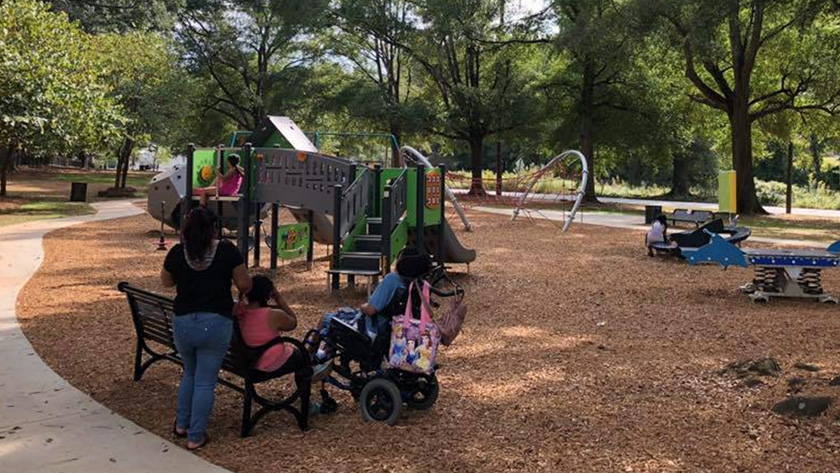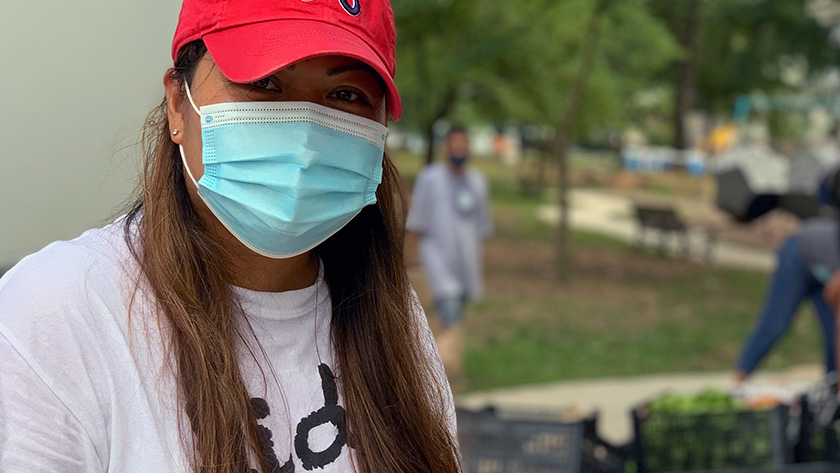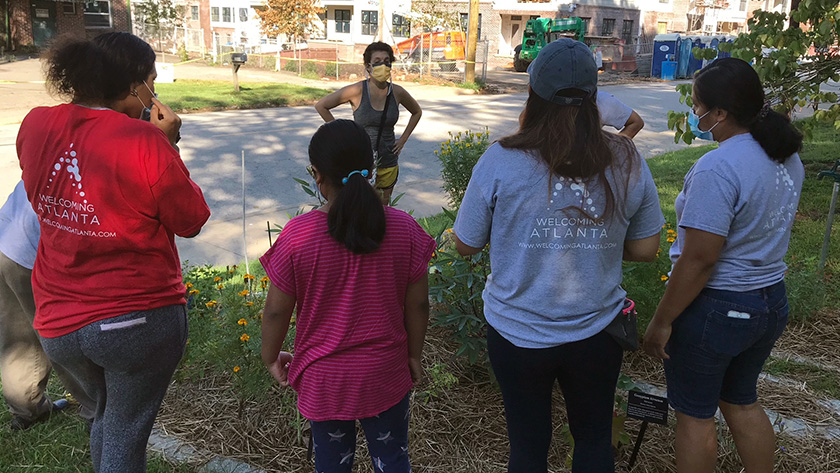2021 Skoll World Forum: Closing the Distance

Like many people, at the start of 2020, I had big plans for the year ahead. In addition to family reunions and work trips, I intended to spend a few weekends in Atlanta, Georgia, where I grew up and which is home to a history-making park I founded in 2018. The Sara J. González Memorial Park is the first in the State to be named for a Latinx individual and is dedicated—through inclusive park features and equity programming—to honoring and celebrating diverse communities in Atlanta. Alas, we all know how the next few months unfolded, and along with the many others, I stayed put for the year working from home and experiencing life through my laptop.
But how do you enrich a park community and enhance a greenspace through Zoom? The city-block sized, ADA-compliant Sara J. González Memorial Park sits in a vibrant and diverse neighborhood that has a legacy Latino community and features an all-abilities playscape, mini soccer field, and community garden dedicated to the State’s first Latino police officer killed in the line of duty.

In the mornings and early afternoons, neighbors walk the park’s perimeter for exercise or eat lunch on a bench under one of the 100-year-old oaks. After school and on weekends, it’s populated with families, as children bound from rope structures to the swings to the climbing rocks and more. In a world where Zoom became the preferred interface and some greenspaces were closed for safety, I assumed the park would go quiet for the year.
In fact, the opposite happened. Thanks to a network of invested, pan-generational citizens coming together for a united goal of positive impact on communities hard hit in 2020, the park thrived—safely and socially distanced—with activities, activism, and assistance. Here’s how we did it:
Starting in the spring, in partnership with the Atlanta Mayor’s Office of Immigrant Affairs, the park began to hold food distributions for approximately 200 immigrant and Latinx families living adjacent to the park. This community, like other traditionally marginalized populations across the United States, struggled disproportionately as a result of the pandemic through deaths, hospitalizations, job loss, and more.

Critical to the success of 35 food events over the year, which supplied nutritious and culturally specific foods, were the mobilization of and deployment of community navigators or promotoras—trusted and beloved mothers and grandmothers mostly—from the park neighborhoods who could share event details in the language of the community. Reimagining the role of a park from recreation (and in our case memorialization) space to practical and central location for safe food distribution was key to giving new meaning to the greenspace.
After the killing of George Floyd, the park hosted a student-led Black Lives Matter gathering, organized by teens from the neighborhood. A few hundred came out to share pledges, poetry, and prayers as well as to participate in a powerful 8-minute and 46-second silent vigil. The students, parents, and teachers convened around the park’s community plaza, where inscribed in a marble circle in Spanish and English are the park’s guiding tenets: diversity/diversidad, unity/unidad, dignity/dignidad, family/familia. Envisioning this park as a symbolic place to honor a pioneering advocate—my mother, Sara González—while offering public representation of her community proved tactically beneficial for organizers looking to honor and uphold social justice values.
In the fall, inspired by the success and impact of the ongoing food distribution events, the park held a first ever Resource Fair in partnership with the Latino Community Fund of Georgia, greenspace advocacy group Park Pride, the Mayor’s Office of Immigrant Affairs, park benefactors, and supporters. With an important election on the horizon, census data deadline looming, and as eviction rates steadily climbed in Georgia, the Resource Fair proved a way to disperse critical information about census participation, voter protections, and tenant rights while providing food, grocery gift cards, and student backpacks.
Latinx advocate Sofia Bork, a millennial community organizer and the park’s Community Engagement Director, led the effort on the ground alongside Michelle Maziar, Director of the Mayor’s Office of Immigrant Affairs/Welcoming Atlanta and her team. Bork also organized socially distanced seasonal Latin ethnobotanical plantings throughout the year at the Officer Edgar Flores Memorial Garden, which she founded and is located on the park grounds.

Prompted by community need, Sofia additionally orchestrated a winter clothing drive for the families near the park and is currently planning children’s bilingual literacy events for this spring to be held at the park’s Learning Nook, a dedicated education space donated by the Georgia Power Foundation that is shaded and has ADA-compliant seating. The history of the park, its foundational tenets, and the social justice driven impact of the year’s first events there created new lanes for future purpose-driven events such that over the course of the year the park’s meaning changed with this momentum being carried into 2021.
The park’s viability—as a place to convene safely for resources, activism and community building in addition to its foundation as a healthy and relaxing greenspace—was evidenced writ large this past year. “During the pandemic, we saw the ethos of the park transform into action through these events led for and by community members spanning generations and further supported by government and philanthropic sectors,” said Maziar. Furthermore, these proofs of concepts will help fuel its impact moving forward.
In addition to the equity-centered literacy events upcoming, the food distributions continue apace and soon the park will be a much-needed Latinx-targeted Covid19 vaccination distribution site. In the coming weeks Sofia will host another culturally specific garden planting with the family of Officer Flores, and the students who led the Black Lives Matter rally will come together to memorialize the victims of the recent tragic spa shootings in Atlanta.
Young and old, pan-ethnic and pan-racial stand in solidarity with the park’s embrace of diversity, a value which has powerfully resonated this year when more than ever we needed sacred spaces to honor inclusion and representation while propelling a changing and improved cultural landscape.
Want more stories of transformational change on the world’s most pressing problems? Sign up for Skoll Foundation’s monthly newsletter.
Notifications